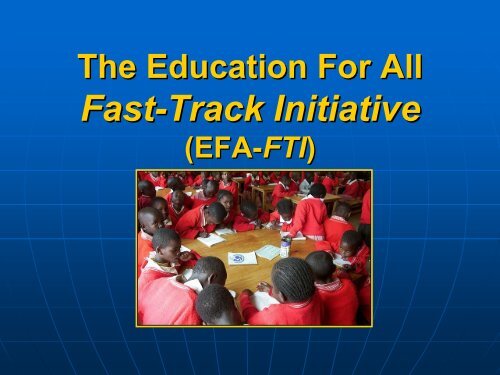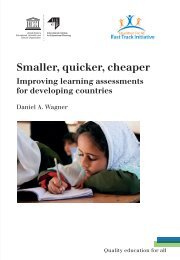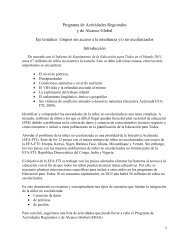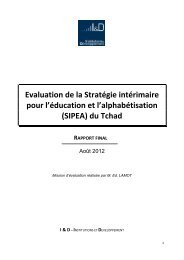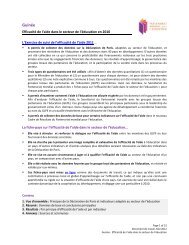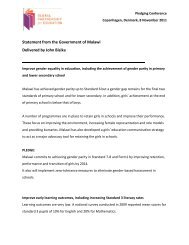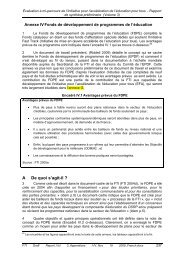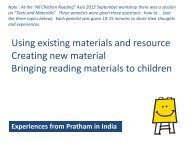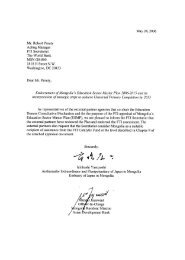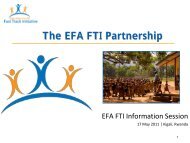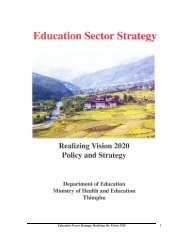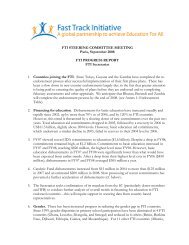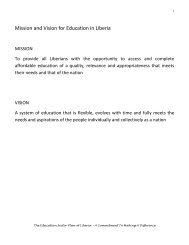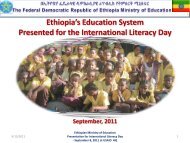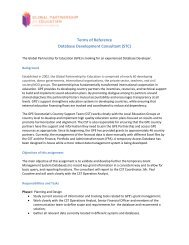FTI - Global Partnership for Education
FTI - Global Partnership for Education
FTI - Global Partnership for Education
You also want an ePaper? Increase the reach of your titles
YUMPU automatically turns print PDFs into web optimized ePapers that Google loves.
The <strong>Education</strong> For All<br />
Fast-Track Initiative<br />
(EFA-<strong>FTI</strong><br />
<strong>FTI</strong>)
Outline<br />
• What is the <strong>Education</strong> <strong>for</strong> All (EFA)<br />
Fast Track Initiative (<strong>FTI</strong>)?<br />
• Why was <strong>FTI</strong> created? The Context<br />
• The <strong>FTI</strong> Compact<br />
• The Appraisal Process<br />
• <strong>FTI</strong> Support Mechanisms:<br />
• Financing through regular channels<br />
• Catalytic Fund<br />
• EPDF<br />
• Next Steps <strong>for</strong> Partner<br />
Countries<br />
• Role of country level donors<br />
• <strong>FTI</strong> Governance Structure<br />
2
What is the EFA-Fast<br />
Fast-Track Initiative?<br />
The <strong>Education</strong> <strong>for</strong> All - Fast Track Initiative (<strong>FTI</strong>)<br />
is a global partnership between developing<br />
countries and donors to accelerate progress<br />
towards the goal of universal completion of<br />
quality primary education by 2015.<br />
• Partners include 30 bilateral and multilateral<br />
donor agencies<br />
• All low-income countries (IDA eligible) may<br />
receive some <strong>for</strong>m of support<br />
3
The Context<br />
The Problem<br />
• Around the world, over 103 million children<br />
are out of school, , of which 58 million girls.<br />
• Evidence is overwhelming that education –<br />
particularly <strong>for</strong> girls– can break the cycle of<br />
poverty, , halt the spread of AIDS, and create<br />
more stable and prosperous nations.<br />
• Many countries will not reach universal primary<br />
education by 2015 if past trends continue.<br />
• Resource needs <strong>for</strong> all countries to reach UPC<br />
(between US$5.6 and 10 billion per year <strong>for</strong> all developing<br />
countries)<br />
countries) are significantly higher than current<br />
ef<strong>for</strong>ts<br />
4
Primary Completion Rate by Region<br />
UPE Goal<br />
100<br />
99<br />
East Asia & Pacific<br />
Europe & Central<br />
Asia<br />
97<br />
94<br />
90<br />
Latin America &<br />
Caribbean<br />
88<br />
80<br />
Middle East & North<br />
Africa<br />
82<br />
Required trends to<br />
reach UPE<br />
70<br />
South Asia<br />
60<br />
62<br />
Sub-Saharan Africa<br />
2003-04<br />
50<br />
5<br />
1990-91 1995-96 2000-01 2005-06 2010-11 2015-16
The Context<br />
International Agreements<br />
• EFA goals adopted at World <strong>Education</strong> Forum,<br />
April 2000, Dakar<br />
• Millennium Development Declaration<br />
adopted, September 2000<br />
• Monterrey Consensus, , March 2002<br />
International Finance and Development<br />
Conference<br />
• Rome and Paris Declarations on Aid<br />
Effectiveness (2003 & 2005)<br />
6
The <strong>FTI</strong> Compact<br />
Partner Countries<br />
• Develop sound<br />
education sector<br />
programs through broad<br />
based consultation<br />
• Demonstrate results on<br />
key per<strong>for</strong>mance<br />
indicators<br />
• Exercise leadership in<br />
developing and<br />
implementing the<br />
program and coordinating<br />
donor support<br />
Mutual<br />
Accountability<br />
Donors<br />
• Help mobilize resources<br />
and make them more<br />
predictable<br />
• Align with country<br />
development priorities<br />
• Coordinate support<br />
around one education<br />
plan<br />
• Harmonize procedures<br />
as much as possible<br />
7
<strong>FTI</strong> Indicative Framework<br />
Suggested benchmarks (not targets) drawn from<br />
analysis of successful countries. Crucial <strong>for</strong><br />
long-term sustainability of MDG progress<br />
INDICATORS<br />
1) Government spending on education – about 20% of<br />
budget<br />
2) Spending on primary education – about 50% of<br />
education budget<br />
3) Teacher salary – about 3.5 times GDP per capita<br />
4) Pupil-teacher ratio – about 40:1<br />
5) Non-teacher salary spending – 33% of recurrent<br />
spending<br />
6) Average repetition rate – 10% or lower<br />
7) Annual hours of instruction – 850 or more<br />
8
What support does the <strong>FTI</strong> offer?<br />
To low-income<br />
countries with PRS<br />
and sector program,<br />
appraised and<br />
endorsed by<br />
supporting donors<br />
• In-country resource<br />
mobilization among donors<br />
and through other channels. <strong>FTI</strong><br />
partnership provides a global<br />
plat<strong>for</strong>m.<br />
• Resource mobilization <strong>for</strong><br />
countries with few donors:<br />
Catalytic Fund (CF)<br />
To all lowincome<br />
countries<br />
• Capacity development<br />
support - Upstream and<br />
downstream - <strong>Education</strong><br />
Program Development Fund<br />
9
ENDORSEMENT PROCESS<br />
Country has prepared a poverty reduction strategy or<br />
equivalent, and an education sector plan<br />
Local agencies involved in supporting the education sector nominate a Coordinating<br />
Agency to lead the <strong>FTI</strong> assessment and endorsement process and serve as the liaison with<br />
the Ministry of <strong>Education</strong>, other concerned Government agencies, and the <strong>FTI</strong> Secretariat<br />
Coordinating Agency:<br />
• Liaises with Ministry of <strong>Education</strong> and local agencies to organize assessment and<br />
endorsement process<br />
• Invites all relevant agencies to participate in the assessment and endorsement process<br />
(each agency is responsible <strong>for</strong> ensuring that its representative consults with its HQ as<br />
needed throughout the process and has the appropriate technical expertise to contribute<br />
substantively)<br />
• Makes available the <strong>FTI</strong> appraisal guidelines and Indicative Framework to the group to<br />
conduct the assessment<br />
Coordinating agency sends sector plan, assessment with conclusion of<br />
endorsement or not, signed by all who participated, to the <strong>FTI</strong> Secretariat<br />
<strong>FTI</strong> Secretariat in<strong>for</strong>ms the full <strong>Partnership</strong> of the<br />
endorsement<br />
Donors mobilize resources<br />
10
Purpose:<br />
<strong>FTI</strong> Appraisal Guidelines<br />
Encourage dialogue on key policy issues<br />
including:<br />
• Adequacy of the knowledge base<br />
• Strategy toward achievement of the MDG/EFA<br />
Goal, including HIV/AIDS and gender<br />
responsiveness<br />
• Ownership by all stakeholders<br />
• Absorptive capacity and financial sustainability<br />
11
Expected Outcomes of the Appraisal<br />
A set of well-justified<br />
recommendations on:<br />
• Volume & composition of<br />
financial and other resources<br />
available to support the program<br />
• Key areas <strong>for</strong> capacity building<br />
• Support to close prioritized<br />
knowledge/data gaps<br />
• Arrangements <strong>for</strong> monitoring<br />
and evaluation<br />
• All donors align their support to<br />
this one program<br />
12
What the Appraisal Process is not<br />
• It is not an appraisal of a separate<br />
EFA or <strong>FTI</strong> project or program, but of<br />
the education sector program of the<br />
country<br />
• It is not an appraisal of only a piece<br />
of the strategy <strong>for</strong> primary education<br />
or a piece of a sector program, the<br />
piece <strong>for</strong> which additional financing is<br />
being sought<br />
13
Financing from Regular Channels<br />
Once the financing gap is known, the <strong>FTI</strong><br />
Secretariat raises awareness at the global<br />
level so that the gap can be filled by:<br />
• Donors present in the country who<br />
increase their support, or<br />
• Donors not yet present in the country<br />
providing new funding, either directly or<br />
through silent partnerships<br />
14
<strong>FTI</strong> Catalytic Fund<br />
• Multi Donor Trust Fund<br />
managed by the World<br />
Bank<br />
• Provides funding in the<br />
<strong>for</strong>m of grants to help close<br />
the financing gap <strong>for</strong><br />
countries with limited donor<br />
presence*, while mobilizing<br />
more sustainable support<br />
through regular bilateral<br />
and multilateral channels.<br />
*Countries with 4 or fewer bilateral partners each giving US$ 1<br />
million or more per year to education<br />
15
CF Contributions and Pledges<br />
CF<br />
2003- Total<br />
In US$ million<br />
2004 2003-<br />
Total Balance to<br />
Country<br />
2005 2006 2007 2008 2008 Payments be paid<br />
Belgium 1.2 2.5 1.2 1.2 6.1 3.7 2.4<br />
Canada 20 20 0 20<br />
EC - - 40.3 40.3 80.6 0 80.6<br />
Ireland - - 1.5 - 1.5 1.5 0<br />
Italy 2.4 2.4 1.2 - 6 4.8 1.2<br />
Luxembourg 0 0 0 0 0 0 0<br />
Netherlands 39.5 54.3 64.8 76.2 234.8 158.6 76.2<br />
Norway 6 8.1 25.6 - 39.7 39.7 0<br />
Russia 1 2 1 4 0 4<br />
Spain - 6 - - 6 6 0<br />
Sweden - 5.3 10.4 0 15.7 15.7 0<br />
UK - - 125.29 124.36 16.83 266.48 0 266.48<br />
49.1 78.6 291.29 244.06 17.83 680.88 230 450.88<br />
In addition, Norway has announced a further US$ 32 million available <strong>for</strong> the <strong>FTI</strong> in 2006. However, the split between<br />
the EPDF and the Catalytic Fund is not yet defined.<br />
16
Catalytic Fund Allocations (as of Nov. 2005)<br />
In US$ million<br />
Country 2003 & 2004 2005 2006 2007 Total<br />
2003-07<br />
1 Djibouti - - 6.0 2.0 8.0<br />
2 Ghana - 8.0 11.0 11.0 30.0<br />
3 Guyana 4.0 4.0 4.0 - 12.0<br />
4 Kenya - 24.2 24.2 24.2 72.6<br />
5 Lesotho - - 7.2 4.7 11.9<br />
6 Madagascar - 10.0 25.0 25.0 60.0<br />
7 Mauritania 7.0 2.0 - - 9.0<br />
8 Moldova - - 4.4 4.4 8.8<br />
9 Nicaragua 7.0 7.0 7.0 - 21.0<br />
10 Niger 13.0 8.0 - - 21.0<br />
11 Tajikistan - - 9.2 9.2 18.4<br />
12 The Gambia 4.0 4.0 4.0 12.0<br />
13 Timor Leste - - 3.0 3.0 6.0<br />
14 Yemen 10.0 10.0 10.0 - 30.0<br />
Total 45.0 77.2 115.0 83.5 320.7<br />
17
<strong>Education</strong> Program Development<br />
Fund (EPDF)<br />
• Multi-donor trust fund administered by<br />
the World Bank<br />
EPDF Contributions and Pledges in US$ millions<br />
Country 2005 2006 2007 2008<br />
Total<br />
Total<br />
2003- Payments<br />
Canada 0 4 0 4 0 4<br />
Ireland -- 0.31 -- 0.31 0.31 0<br />
2008<br />
Luxembourg -- 1.3 -- 1.3 1.3<br />
Balance to be<br />
paid<br />
Netherlands - 7.2 - 7.2 0 7.2<br />
Norway 4.87 15 -- 19.87 19.87 0<br />
Russia 1.2 2 3.2 0 3.2<br />
Sweden -- 2.6 -- 2.6 2.6 0<br />
UK 0.94 3.2 4 8.14 2 6.14<br />
Total 5.81 33.61 5.2 2 46.62 26.08 20.54<br />
0<br />
18
<strong>Education</strong> Program Development Fund (EPDF)<br />
Objectives<br />
• Increase the number of low-income countries with<br />
sound and sustainable education sector programs<br />
• Strengthen country capacity to develop policies and<br />
sector programs through a broad-based based consultative<br />
process<br />
• Improve and share knowledge of what works<br />
• Strengthen donor partnerships and harmonization at<br />
the country level<br />
• Strengthen partnerships with regional networks and<br />
institutions<br />
19
<strong>FTI</strong> Helps Both Sides of the Compact<br />
Mechanism to accelerate progress towards<br />
universal primary education<br />
Developing Countries:<br />
• More efficient aid <strong>for</strong><br />
primary education<br />
• Sustained increases in<br />
aid <strong>for</strong> primary<br />
education<br />
Donors:<br />
• Plat<strong>for</strong>m <strong>for</strong> aid<br />
effectiveness<br />
• Better coordination<br />
and harmonization of<br />
aid at national and<br />
global level<br />
• Sharing of knowledge<br />
and experience<br />
• More countries on<br />
track to achieving UPC<br />
20
Next Steps <strong>for</strong> Partner Countries<br />
• Pursue <strong>FTI</strong> discussions with your local donor<br />
group<br />
• Take leadership in developing an education<br />
sector plan (only one plan)<br />
• Mobilize country level donors and other<br />
resources to provide support as needed<br />
• Discuss and agree with donors on the appraisal<br />
process<br />
• Ensure the provision of annual in<strong>for</strong>mation on<br />
key progress indicators and financial status to<br />
the local donors<br />
• Recommend that the EFA/MDG goal <strong>for</strong> basic<br />
education is a national priority, adequately<br />
reflected in the Poverty Reduction Strategy or<br />
other national development strategy<br />
21
What is the Role of Donors at the<br />
Country Level?<br />
You are an <strong>FTI</strong> donor partner and key to making <strong>FTI</strong> work.<br />
Here are the basic steps you can take to help get countries on-<br />
track:<br />
• Support the country to develop a sound sector strategy and program<br />
• If the country needs support to develop its sector plan, donors may be<br />
able to access funding through the EPDF. To access the EPDF, contact the<br />
lead coordinating agency or the World Bank task team leader at the t<br />
country level.<br />
• If greater donor involvement is needed in the policy dialogue and d to<br />
support program preparation, let the <strong>FTI</strong> Secretariat know. It will try to<br />
find another partner through the global partnership.<br />
• Exhaust your own possibilities to increase financing <strong>for</strong> the country<br />
ntry’s<br />
sector program.<br />
• To pursue additional financing of the country’s s endorsed sector program,<br />
in<strong>for</strong>m the <strong>FTI</strong> Secretariat which will help to mobilize the resources at<br />
the global level and through the Catalytic Fund <strong>for</strong> qualifying countries. c<br />
• If you are the lead coordinating agency, liaise with the Secretariat riat and<br />
provide up-to<br />
to-date in<strong>for</strong>mation on financial status and per<strong>for</strong>mance<br />
22
<strong>FTI</strong> Governance Structure<br />
<strong>FTI</strong> PARTNERSHIP MEETINGS<br />
(Annual - attended by donor<br />
and country partners, NGOs)<br />
Sets strategic policy direction of <strong>FTI</strong><br />
Advocates on behalf of <strong>FTI</strong><br />
<strong>FTI</strong> SECRETARIAT<br />
<strong>FTI</strong> STEERING COMMITTEE<br />
2 <strong>FTI</strong> CO-CHAIRS<br />
WORLD BANK<br />
UNESCO<br />
LAST OUTGOING <strong>FTI</strong> CO-CHAIR<br />
give direction<br />
support<br />
<strong>FTI</strong> WORKING GROUP<br />
HARMONIZATION<br />
<strong>FTI</strong> WORKING GROUP<br />
COMMUNICATIONS<br />
<strong>FTI</strong> WORKING GROUP<br />
FINANCE<br />
23
<strong>FTI</strong> Secretariat Contacts<br />
Secretariat Staff Liaison <strong>for</strong> Contact in<strong>for</strong>mation<br />
Desmond Bermingham<br />
Head<br />
dbermingham@worldbank.org<br />
202-458<br />
458-7169<br />
Robert Prouty<br />
Deputy Head<br />
rprouty@worldbank.org<br />
202-473<br />
473-75327532<br />
Kouassi Soman<br />
Anglophone Africa, Latin<br />
America & the Caribbean,<br />
Europe & Central Asia, Middle<br />
East & North Africa<br />
ksoman@worldbank.org<br />
202-473<br />
473-47134713<br />
Luc-Charles Gacougnolle<br />
Francophone & Lusophone<br />
Africa, South & East Asia<br />
lgacougnolle@worldbank.org<br />
202-458<br />
458-2050<br />
Abby Spring<br />
Communications<br />
aspring@worldbank.org<br />
202-458<br />
458-9491<br />
Palak Mehra<br />
Trust Fund administration<br />
pmehra@worldbank.org<br />
202-458<br />
458-9826<br />
Anna Triponel<br />
Special Projects<br />
atriponel@worldbank.org<br />
202-473<br />
473-2400<br />
Chantal Rigaud<br />
Program Assistant<br />
crigaud@worldbank.org<br />
202-458<br />
458-9746<br />
Michelle Mesen<br />
Program Assistant<br />
mmesen@worldbank.org<br />
202-458<br />
458-55895589<br />
24
<strong>FTI</strong> Donor Contacts<br />
Donor Contact Name Contact in<strong>for</strong>mation<br />
AfDB<br />
ADB<br />
AUSAID<br />
BELGIUM<br />
CANADA<br />
DENMARK<br />
EUROPEAN COMMISSION<br />
FINLAND<br />
FRANCE<br />
GERMANY<br />
IADB<br />
IRELAND<br />
ITALY<br />
Alice Hamer<br />
Jouko Sarvi<br />
Sue Connell<br />
Kris Panneels<br />
Nadine Dusepulchre<br />
Kara Mitchell<br />
Torben Lindqvist<br />
Anton Jensen<br />
Marja Karjalainen<br />
Juhani Toivonen<br />
Anne Paugam<br />
Sandrine Boucher<br />
Temby Caprio<br />
Juan Carlos Navarro<br />
Maíre Matthews<br />
Antonio Bernardini<br />
Teresa Savenella<br />
a.hamer@afdb.org<br />
jsarvi@adb.org<br />
sue.connell@ausaid.gov.au<br />
Christian.panneels@diplobel.fed.be<br />
nadine.dusepulchre@diplobel.fed.be<br />
Kara_mitchell@acdi-cida.gc.ca<br />
cida.gc.ca<br />
torlin@um.dk<br />
anton.jensen@cec.eu.int<br />
marja.karjalainen@cec.eu.int<br />
juhani.toivonen@<strong>for</strong>min.fi<br />
paugama@afd.fr<br />
sandrine.boucher@diplomatie.gouv.fr<br />
Temby.Caprio@bmz.bund.de<br />
juancn@iadb.org<br />
maire.matthews@iveagh.gov.ie<br />
antonio.bernardini@esteri.it<br />
teresa.savanella@esteri.it<br />
JAPAN Megumi Kito Megumi.kito@mofa.go.jp<br />
NETHERLANDS<br />
Ronald Siebes<br />
Rebekka van Roemburg<br />
ronald.siebes@minbuza.nl<br />
Rebekka-van.roemburg@minbuza.nl<br />
NORWAY Olav Seim olav.seim@mfa.no<br />
RUSSIA Andrei Volkov volkov@anx.ru<br />
SPAIN<br />
Maria Dolores Martín Villalba<br />
Mari Cruz del Saso<br />
lola.martin@aeci.es<br />
Maricruz.delsaso@aeci.es<br />
SWEDEN Kaviraj Appadu Kaviraj.appadu@sida.se<br />
UNITED KINGDOM<br />
Richard Arden<br />
Halima Begum<br />
R-arden@dfid.gov.uk<br />
H-Begum@dfid.gov.uk<br />
UNAIDS Gillian Holmes holmesg@unaids.org<br />
UNESCO<br />
Mark Richmond<br />
Khawla Shaheen<br />
m.richmond@unesco.org<br />
k.shaheen@unesco.org<br />
UNICEF Cream Wright cwright@unicef.org<br />
USA Joseph Carney carneyjp2@state.gov<br />
25<br />
WORLD BANK<br />
Ruth Kagia<br />
Robin Horn<br />
rkagia@worldbank.org<br />
rhorn@worldbank.org
Thank You <strong>for</strong> your attention<br />
For more in<strong>for</strong>mation, visit our website:<br />
www.fasttrackinitiative.org<br />
26


